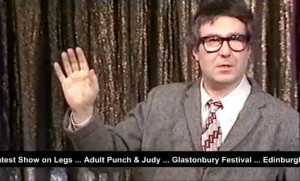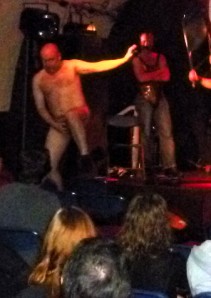
In the summer of 1981, Malcolm Hardee and The Greatest Show on Legs were appearing in London slightly off-West End (at the Bloomsbury Theatre) in The Mad Show – a collection of kinda eccentric speciality acts.
These included Anthony Irvine (later called The Iceman) who, at that point in his career, did an act where he crawled across the stage wearing a yellow souwester cape and Wellington boots, got up a ladder, put a chain with a hook on it between the two parts of the stepladder and picked up a bag. He then took a toothbrush out of the bag, cleaned his teeth, got down the steps and crawled off stage again. This took between 10 and 20 minutes depending on audience response.
It was a golden era of bizarre genre-crossing speciality acts.
Also on the show was musician/ performer/ actor/ comic Bob Flag (aka Bob Evans) with an odd act involving a saxophone. He had played with musicians like David Bowie, Ken Campbell, Thunderclap Newman and the Bonzo Dog Doo-Dah Band.
In The Mad Show, he came on stage several times dressed in various Army regalia for mostly unfathomable reasons.
Three years later, in 1984, Bob Flag was the face of Big Brother in the movie version of Nineteen Eighty-Four.
His other film roles included the ever-so slightly odd 1986 TV movie The Madness Museum, which also included comic performers Ken Campbell & Marcel Steiner, musical people Den Hegarty & Edward Tudor-Pole and the admirable David Rappaport. All of whom, I think, appeared on children’s TV series Tiswas during my time there.
In 1989, Bob Flag appeared in the movie Cold Light of Day. He played the central character based on notorious serial killer Dennis Nielsen. Comedian Eugene Cheese played Bob’s father in the film.
Uncategorisable performer Tony Green aka Sir Gideon Vein told me yesterday: “I think Bob got Eugene the part – I turned down ‘third rent boy’”.
In 1990, Bob and his wife artist Takae Horton took part in The Flip Show, the pilot for a Gong Show rip-off which Malcolm Hardee and I produced for Noel Gay Television/BSB. Their act was fairly indescribable and may eventually see the light of day on YouTube.
Yesterday, though, I heard from the above-mentioned uncategorisable Tony Green aka Sir Gideon Vein.
He wrote…
I received an e-mail from Takae Horton a little before 3.00am this morning informing me that her beloved husband Bob Flag had passed away on July 31st. She contacted me from Japan where it is eight hours ahead. Takae was the talented artist wife of the Bob in question.
I last heard from Bob in April this year and was about to send him an e-mail regarding Tony Allen’s recent pre-wake.
Bob, was 92 in June, had been far from well and had been living in Japan for around the last 15 years. Takae is Japanese and together they set up The Marufuku Gallery in a small village high up in the mountains of Okayama Province – for them a dream come true.
I first met Bob back in 1980 or 1981 along with John Hegley – when he and I were doing a double act. At that time, Bob was running his ‘totally off the wall’ Krisis Kabaret. I recognised Bob as a ‘fellow traveller’ and we remained friends from that time onward. Bob always put 150% into everything he did.
If you wanted something different you were sure to find it in Krisis Kabaret. Comic lunacy/inspired madness on a high level. Refreshingly, it was far removed from the school of ‘look at me aren’t I clever and just possibly funny too?’
Bob was a veteran even then.
He had turned down an offer to get involved with Tony Allen‘s original Alternative Cabaret. Tony needed acts who had sets of a known duration then – but Bob always hated repeating himself. Spontaneity was virtually his middle name. An early manifestation was The Riot Squad back in the early 1960s showcasing Bob’s (he was Bob Evans then) talent as a saxophonist with David Bowie on vocals. Bowie’s onetime wife Angie was later to become involved with Bob’s ‘Krisis Kabaret’. (Do, if you can, get a copy of Bob’s lavishly illustrated autobiography Drumshtick published 2017 – although I fear this will not be easy)
Bob was also one of the comics who appeared on the opening night of Peter Rosengard’s infamous original (London) Comedy Store featuring Alexei Sayle and the (dreaded) gong in 1979. He garnered much praise for stealing the show.
Regrettably, Bob was never going to pave a career as an alternative comic. The fact that he was a fair bit older than everyone else at the time didn’t really come into it. It just wasn’t what he wanted – he was always a maverick and would always go his own way.
The ‘trouble’ with Bob as far as I was concerned was that he had just far too many arrows to his bow. He was a talented all-rounder and he wasn’t going to concentrate in any one area.
He was a talented sax player – his preference was for alto, though I thought he was much better on tenor. Bob was proficient on many instruments.
Among other things, he was a hyper-polyglot – he learned his wife’s language pretty early – no easy feat.
He was incredibly quick at everything he did. Sometimes I thought if he hadn’t been so quick he would have got the kudos he deserved – but I don’t think that worried him too much.
I fondly remember him inviting me to dinner many years ago in his immensely cluttered King’s Cross flat.
“But Bob,” I said, “there’s nowhere to sit!”
“Of course, there is!” he replied.
And …yes… as if by magic (Bob could often be magical) he pulls out a table from somewhere and in no time there’s a bottle of wine, plates of well- cooked food and seating for the three of us.
He could be a harsh heckler, though.
On one occasion, he heckled Norby West (formerly The Brixton Bank Manager): “How come you have so much confidence and so little talent?” (Norby was being deliberately naff).
He then preceded to drag Norby off the stage.
Even I thought it was part of the act. But it wasn’t.
Bob could also be humble, though, and was not above apologising.
Many years later, Norby told me Bob had contacted him regretting his actions that night. Norby had forgiven him years before anyway.
I would book Bob on a number of occasions over the years (and it was likewise). He was always totally dependable and an absolute pleasure to have on board. He will be sadly missed and my heart goes out to Takae.
Bob really was a rare one-off and I know this has been said about departed people countless times before but I have not the slightest hesitation in saying it about Bob Flag…
THE WORLD SHALL NOT SEE HIS LIKE AGAIN.
(… MORE ON BOB FLAG (AND THE ICEMAN) HERE…)





